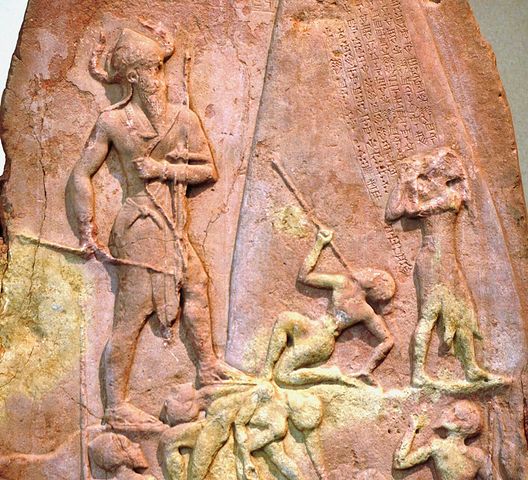Akkadian omens
Mixed matings
Mammalian Hybrids
 Stele of Narâm-Sîn, king of Akkad, celebrating his victory against the Lullubi from Zagros (c. 2250 B.C.).
Stele of Narâm-Sîn, king of Akkad, celebrating his victory against the Lullubi from Zagros (c. 2250 B.C.).
Centered on the city of Akkad, the Akkadian Empire, which existed in the third millennium B.C., was the first Semitic-speaking empire of the Tigris-Euphrates Valley.
The Akkadians believed in omens, that is, in the idea that present-day occurrences can foretell future events. For this reason, they compiled lists indicating the expected future consequence for each different kind of event. Among those omens were cases in which animals were observed choosing mates not of their own kind. Their listings of such cases are interesting not only because they show that the Akkadians knew animals do in fact make such choices, but also because they provide information about the specific combinations of which the Akkadians were aware. Many of these combinations have been forgotten in modern, urban-oriented culture.
The following is a collection of omens and consequences taken from Sally M. Freedman's interesting book If A City Is Set On A Height: The Akkadian Omen Series Šumma Alu ina Mele Šakin (vol. 3, The University of Pennsylvania Museum, 2017). These omens are quoted from ancient clay tablets, which are often broken or for other reasons illegible. So bracketed words and letters indicate portions of the omen text completed on the basis of other existing texts. Ellipses indicate missing text that could not be surmised.
Omens about mixed matings:
If a sheep approaches a pig (sexually)—dispersal of [the man’s house.] (Freedman, p. 6)
[If] a sheep rubs against a pig (sexually), [there will be] abandonment of [the man’s house.] (p. 6)
If a sheep approaches a dog (sexually), [an enemy will seize] the plain of the land. (p. 6)
If a sheep rubs against a dog (sexually)—booty [for the man.] (p. 6)
[If] a white sheep mounts a she-goat—disagreement in the land. (p. 6)
If an ox approaches a donkey (sexually), a god of the land [will become strong; the place (?) will be dispersed; … will attain ….] (p. 13)
If an ox rubs against a donkey (sexually)—[downfall / uprising of an enemy for the man.] (p. 13)
If an ox approaches a horse (sexually), the king [will die and his land will diminish / dispersal of the man’s house.] (p. 13)
If an ox rubs against a horse (sexually), [defeat of an enemy / abandonment of the man’s house.] (p. 13)
If a donkey mounts a man, that man will be sold for money or hardship will afflict him. (p. 20)
If a donkey approaches an ox (sexually)—destruction of the pen; alternatively, a strong place in that city will be destroyed. (p. 20)
If a donkey rubs against an ox (sexually), the pen will be finished. (p. 20)
[If] a horse approaches an ox (sexually)—trouble for the man’s house. (p. 22)
If a horse rubs against an ox (sexually)—diminishment of the pen …. (p. 22)
If a fox approaches a dog (sexually)—destruction of that land. (p. 36)
If a fox approaches a sheep (sexually)—dispersal of that land. (p. 36)
If a dog [approaches] a woman (sexually) […] (p. 59)
If a dog rubs a[gainst] a woman (sexually) […] (p. 59)
If a dog [approaches] a pig (sexually) […] (p. 59)
If a dog ru[bs again]st a pig (sexually)—property of the city god / diminution of […] (p. 59)
If a dog approaches a fox (sexually), prices will de[crease] for three years. (p. 59)
If a dog rubs against a fox (sexually)—abandonment of the commons […] (p. 60)
If a dog approaches a sheep (sexually)—diminution of the animal pen; disperal of [the house]. (p. 60)
If a dog rubs against a sheep (sexually)—there will be pestilence / famine / Irra in the land. (p. 60)
If a dog approaches] a wolf (sexually), the owner of the commons will change; th[at] city […] (p. 60)
If a pig approaches a woman (sexually)—abandonment of the house / […] (p. 72)
If a pig rubs against a woman (sexually)—famine / cattle will go out. (p. 72)
If a pig approaches a dog (sexually), the great will become small; the ruler of that city […]. (p. 72)
If a pig rubs against a dog (sexually)—famine / there will be famines. (p. 72)
If a pig approaches a sheep (sexually), Adad will devastate the cattle of the land. (p. 72)
If a pig rubs against a sheep (sexually)—decease of cattle. (p. 72)
If a pig [approaches] a do[g (sexually)], the owner of the house will have a loss in his family; [x] will die. (p. 72)
In addition, Freedman (2017, p. 33) states that one tablet "preserves three wild animal omens in a context of sexual activity among different kinds of animals," which indicates that the Akkadians, who lived more than 4,000 years ago, were aware that hybridization occurs in the wild—something many people are no longer aware of today.